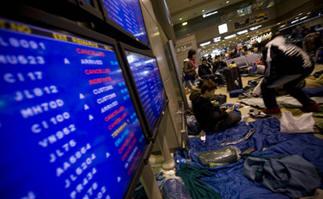|
Australia
- The Department of Health and Ageing and Australian Radiation
Protection and Nuclear Safety Agency (ARPANSA) has issued the following
advice on exposure to radiation arising from nuclear incidents in Japan,
based on information from Japanese authorities. Australians returning
home from
Japan
are highly unlikely to be contaminated or exposed to significant
radiation and will not require checks for radioactivity. However, if
people wish to seek medical advice they should contact their local GP.
Source:
http://www.smartraveller.gov.au/zw-cgi/view/TravelBulletins/Information_for_Australians_in_Japan
Chinese Taipei
- Media report that iradiation detectors have been installed at the
airport.
Germany
- The Federal Foreign Office is warning against visits to the north-east
of Honshu Island.
Travelers are currently advised to avoid all non-essential travel to Japan.
The German Embassy in Tokyo
has transferred to Osaka-Kobe for the time being. The Federal Foreign
Office recommends that all Germans in the region around the
Fukushima
nuclear power plants and in the Tokyo/Yokohama area move to
Osaka
for the time being or leave the country via Osaka. The Embassy in
Tokyo
and the Consulate-General in Osaka have
set up a consular team which is operating at Osaka-Kobe station
(Shin-Ōsaka) as well as at
Kansai International Airport
in Osaka-Kobe. France
- The French Government does not recommend traveling to
Japan. Source:
www.diplomatie.gouv.fr/fr/conseils-aux-voyageurs_909/pays_12191/japon_12268/index.html
Hong Kong SAR, China
- A health desk was set up at for passengers arriving from
Japan. Passengers may approach the
health desk for services if they do not feel well, particularly those
who have stayed in the northeastern part of Honshu,
Japan, in the past few days. Signs have
been erected in the restricted area of the Arrivals Hall to guide
passengers to the health desk. Passengers may also seek directions from
staff at the Temperature checkpoints. Source:
http://www.info.gov.hk/gia/general/201103/16/P201103160312.htm
India
- The Times of India reports that a dedicated counter for radiation
screening is operational 24/7 at Chennai
Airport for passengers arriving from
Hong Kong and
Singapore.
Indonesia
-
Travel Advisory for Indonesian citizens who will travel to
Japan
have to report/inform the Indonesian Embassy in Japan.
No action taken yet for passenger ex Japan.
Source: Ministry of Foreign Affairs
www.deplu.go.id/Pages/Default.aspx?l=en
Japan
- Latest news from Narita Airport:
www.narita-airport.jp/en/
The World Meteorological Organization has activated its
Environmental Emergency Response mechanism and it’s Regional Specialized
Meteorological Centers in Asia (Beijing, Tokyo and Obninsk, Russian
Federation) are closely monitoring the situation.
Korea
- The Korean government installed two radiation-detecting gates at
Incheon International Airport
on 17 March. According to the Ministry of Education, Science and
Technology and the Korea Institute of Nuclear Safety, travelers coming
from Japan, if they want, are to pass
between two poles after immigration checks.
The detector carries out a thorough inspection and is capable of
detecting even small amounts of radiation. When an abnormal levels of
radiation is detected, the passenger is to be tested with a separate
machine for further inspection. No suspected cases of contamination were
found as of Thursday morning. The government plans to install more
detector gates at the Gimhae International
Airport that frequent flyers between Korea and Japan prefer to use.
Malaysia
- Passengers screened on arrival from Tokyo with mobile walk through radiation
detecting device * All bags screened.
New Zealand
- New Zealanders returning home from Japan
are highly unlikely to be contaminated or exposed to significant
radiation and will not require checks for radioactivity. Source:
www.safetravel.govt.nz/destinations/japan.shtml
Romania
- Prime Minister to set up a cell of rapid response and information
within the National Commission for Nuclear Activities’ Control to
monitor the situation. If necessary, the Government will repatriate
Romanian citizens living in Japan.
Source:
http://www.gov.ro/mrs-ioana-muntean-the-executive-is-ready-at-any-moment-to-intervene-and-bring-the-romanian-citizens-from-japan-if-this-is-necessary__l2a112639.html
Switzerland
- The Federal Department of Foreign Affairs (FDFA) advises against all
travel to north-eastern Japan,
as well as to the prefectures of Nagano
and Niigata. It advises against
tourist- and other non-essential travel to the rest of Japan.
It also recommends all Swiss citizens who are currently in the
crisis area, as well as those in the greater Tokyo/Yokohama area, to
temporarily leave those areas. Source: (In French)
http://www.eda.admin.ch/eda/fr/home/travad/hidden/hidde2/japan.html
Taiwan
- Media report that Taiwan has installed radiation
detectors at the airport.
Thailand
- The action from AOT at Suvarnabhumi airport is divided into 2 areas:
On Departure: AOT will set up a Health Consultation desk at PTB level 4,
Entrance 6 for passengers who will travel to JPN. Doctors and nurses
from Public Health Ministry will be available as consultant mainly for
Thai passengers. Other passengers are also welcome. * Distribution of
iodine tablets to passengers bound to Japan.
On Arrival: AOT
will set up a Health Consultation desk at arrival gate of airline ops
from JPN. Health control officer will distribute forms for Thai
passengers to complete (the form only in Thai at first stage). Doctors
and nurses from Public Health Ministry will be available. For passengers
arriving from the risk area, medical staff may consider further
treatment. Passengers who wish to have medical check up after arrival, 2
hospitals are recommended "Rajavidhi Hospital n
Nopparat
Hospital".
Arriving pax being walked
through screen with geiger counter. No action on cargo, bags and
catering equipment check. However The Food and Drug administration has
random checked perishable shipment from JPN. Source: http:www.thairath.co.th/content/edu/156448
Turkey
- Ministry of Foreign Affairs recommends not to travel to
Japan.
|


